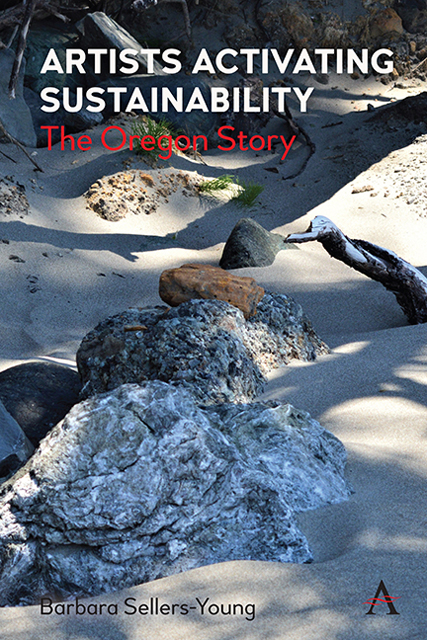Book contents
- Frontmatter
- Dedication
- Contents
- Acknowledgments
- List of Figures
- Introduction: Art, Environment and Metaphor
- 1 Environmental Activism, Arts and the Land of Eden Landscape One: High Desert Basin and Range
- Landscape One High Desert Basin and Range
- Landscape Two Columbia Gorge and Plateau
- Landscape Three Cascade Range
- Landscape Four The Willamette Valley
- Landscape Five Rogue River Valley
- Landscape Six Oregon Coast and Coast Range
- Index
1 - Environmental Activism, Arts and the Land of Eden Landscape One: High Desert Basin and Range
Published online by Cambridge University Press: 10 January 2023
- Frontmatter
- Dedication
- Contents
- Acknowledgments
- List of Figures
- Introduction: Art, Environment and Metaphor
- 1 Environmental Activism, Arts and the Land of Eden Landscape One: High Desert Basin and Range
- Landscape One High Desert Basin and Range
- Landscape Two Columbia Gorge and Plateau
- Landscape Three Cascade Range
- Landscape Four The Willamette Valley
- Landscape Five Rogue River Valley
- Landscape Six Oregon Coast and Coast Range
- Index
Summary
Have you ever suffered from the cheerless winters of Minnesota?
Come to Oregon, where we have no extremes of heat or cold.
Have the drought and grasshoppers of Kansas eaten you out of house and home?
Come to Oregon, where a failure of crops was never known.
Have you ever been struck by an old-fashioned Dakota Blizzard?
Come to Oregon, where the hardest storms are but a lullaby in comparison.
Have you ever been caught in the path of an Iowa Cyclone?
Come to Oregon, where cyclones and subterranean dug-outs are unknown.
—Newspaper Advertisement of Oregon Land CompanyJudd and Beach point out in Natural States that Oregon's cultural and environmental imagination is part of an evolving narrative “of cherished rural values like open space, clean air and waters, natural scenery, quiet surroundings” that is a perpetuation of the image of “Ouragon—the fabled land of promise.” For example, in 2019, 2.9 million Oregonians camped in Oregon's state parks managed by six National Park Service units, two national monuments, 13 national forests, 47 wilderness areas, one national historic site and two national historic trails. In fact, 52.9 percent of Oregon is federal land. There are also 256 state parks, including camping at 58 parks. Additionally, each city and county includes numerous parks. For example, Oregon's largest city Portland has 10,000 acres of parks and natural areas. Each of these parks and forest sites are managed by a cohort of park rangers and park personnel that care for the park's plants and animals. This includes protecting them from fire.
The forest fires of September 2020, as noted in the introduction of this book, sent a shock wave across Oregon communities. Throughout September and into October, the newspapers across the state ran a series of articles that initially documented the attempts to stop the fires, while later articles covered the devastation to homes, towns and the coveted forest landscapes. The community of sustainability activists felt a specific loss in the death of Oregon environmental icon George Atiyeh who lived in a burned over area of Opal Creek. Nephew of the former governor of Oregon, Victor Atiyeh, George was in the 1970s an advocate for Opal Creek, home to one of the last roadless, uncut forests in the Oregon's Cascades.
- Type
- Chapter
- Information
- Artists Activating SustainabilityThe Oregon Story, pp. 21 - 42Publisher: Anthem PressPrint publication year: 2022



